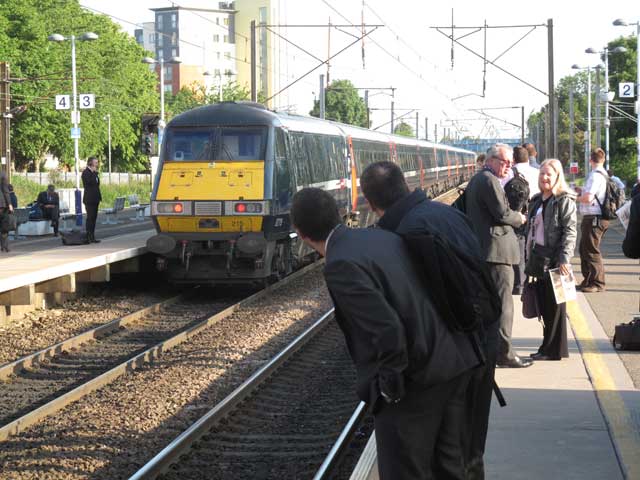Simon Calder: The golden age of rail - long gone or on track?
The man who pays his way

Your support helps us to tell the story
From reproductive rights to climate change to Big Tech, The Independent is on the ground when the story is developing. Whether it's investigating the financials of Elon Musk's pro-Trump PAC or producing our latest documentary, 'The A Word', which shines a light on the American women fighting for reproductive rights, we know how important it is to parse out the facts from the messaging.
At such a critical moment in US history, we need reporters on the ground. Your donation allows us to keep sending journalists to speak to both sides of the story.
The Independent is trusted by Americans across the entire political spectrum. And unlike many other quality news outlets, we choose not to lock Americans out of our reporting and analysis with paywalls. We believe quality journalism should be available to everyone, paid for by those who can afford it.
Your support makes all the difference.The passengers gathering for Thursday morning's 7.08am from King's Cross station had a keen sense about their golden age of rail travel. The clue was in their destination: Carlisle, not a station served by scheduled trains from the terminus. They were booked aboard a charter train, being run for enthusiasts and using 1960s rolling stock in crimson and cream livery (a colour scheme soon christened "blood and custard").
It could hardly be described as a nostalgia express: the train trundled north on the slow line, and took twice as long as the normal 20 minutes to reach Stevenage. All the more time to revel in the good old days of the railways, as expresses race by at 125mph.
It is marvellous that we celebrate Britain's railway heritage, and that enthusiatists are so dedicated to preserving the best from our pioneering past. But as Sir Roy McNulty's hard-hitting new report, Realising the Potential of GB Rail points out, the problems that beset 21st-century rail travellers are hangovers from as far back as the Victorians.
Some good news: rail travel has never been safer, and trains are twice as reliable as they were in the awful year of 2001 following the Hatfield rail crash. In 15 years, rail use has risen by 60 per cent. In any normal industry, you would expect economies of scale to mean costs rising by a much lower figure. Not on the railways, because of the inefficiencies built into the system. If a ticket machine at a station needs replacing, says Sir Roy, the task involves "at least 10 decision-making stages".
When Network Rail needs access over private land, landowners can "extract ransom payments" because such transactions are still governed by the Railway Regulation Act of 1842 – a year, no doubt, that some later Victorians regarded as the golden age of rail travel.
Equally anachronistic are the old British Rail terms and conditions that still apply in many parts of the network. The report found that many drivers spend less than half their working hours actually driving trains, because of antiquated agreements on rest breaks – the same kind of deals that regard Sunday working as optional, with the entire operation run on overtime.
Yet the very people who have allowed this picture of inefficiency to prevail – the directors of Network Rail and train operating companies – have enjoyed pay rises 20 per cent above the UK average over the past three years. It adds up to an expensive insult from the rail industry to both passengers and taxpayers.
If you think things can only get better, you're in luck. On Monday, expect much ministerial rejoicing at the "Eureka" timetable to be introduced this weekend on the East Coast Main Line. It heralds the first Leeds-London trip in under two hours, and the return of sub-four hour trains between Edinburgh and London. A welcome development, which has already persuaded easyJet to drop its Newcastle-Stansted flight, but really only tinkering around the edges: the faster times apply only on one train each day, and southbound only.
The UK enjoys easily the most efficient aviation system in Europe. Unless our railways get equally fit for purpose, to provide the mobility that Britain needs, we may soon mourn the golden age of the railway, circa 2011.
The last refuge of the standard-class scoundrel
Step aboard the 5.50am from Edinburgh to King's Cross, and you are transported to a place even better than a land of milk and honey: the train of bacon and eggs. The enticing aroma that only bacon on the point of perfection can deliver (to non-vegetarians, at least) mingles with a comforting waft of grilling toast.
Add the promise of Cumberland sausages and mushrooms and tea, and you are all set for the UK's flagship route.
As cities, seashores and meadows blur past, transport blends blissfully with gastronomy.
Until yesterday, even standard-class passengers could enjoy all this: if first-class ticket holders didn't fill the dining car, £14 bought breakfast and an upgrade for as long as you could plausibly linger.
This weekend, the dining car disappears, removing the last refuge of the standard-class scoundrel. It becomes more seating for first-class passengers, who now get free at-seat meals. Yet a solution now awaits on arrival in London: cross the road to St Pancras station, where the magnificent Booking Office restaurant serves a fine full English with flair.
Join our commenting forum
Join thought-provoking conversations, follow other Independent readers and see their replies
Comments